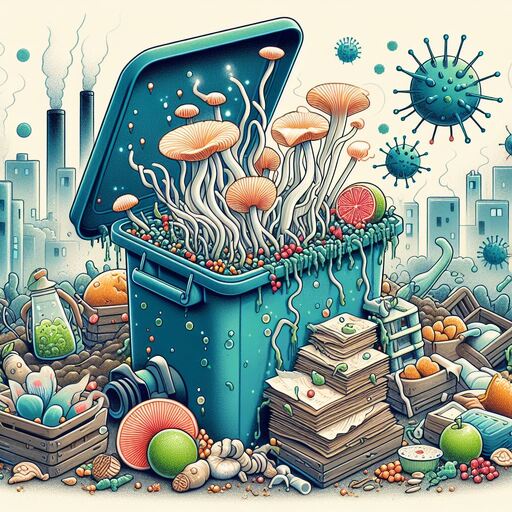Aspergillus’ Role in Reducing Waste
Aspergillus’ Role in Reducing Waste
Eco-Friendly Innovator: Aspergillus’ Role in Reducing Waste
In the global push towards sustainability, the role of microorganisms in waste reduction and resource recovery is gaining unprecedented attention. Among these biological agents, Aspergillus, a genus of fungi, stands out for its remarkable ability to transform waste into valuable products. This article explores the multifaceted role of Aspergillus in waste management, detailing how it contributes to environmental sustainability by reducing waste and recycling it into commercially and ecologically valuable products.
Understanding Aspergillus
Aspergillus’ Role in Reducing Waste
Aspergillus is a genus of molds that includes hundreds of species, many of which are found ubiquitously in the environment. These molds are not just common decomposers; they possess the unique ability to break down complex organic materials that many other organisms cannot, making them invaluable in waste management processes.
Aspergillus in Organic Waste Decomposition
One of the primary environmental challenges today is the management of organic waste, which includes food scraps, agricultural byproducts, and other biodegradable materials. When improperly managed, organic waste contributes to landfill overflow, methane emissions, and other pollution issues. Aspergillus plays a crucial role in addressing this problem by accelerating the decomposition process of organic waste, thereby reducing its volume and the potential for methane generation.
Through the secretion of a wide array of enzymes, Aspergillus breaks down complex organic compounds into simpler substances. This capability is harnessed in composting processes where Aspergillus species are added to organic waste to enhance the breakdown of tough plant materials like cellulose and lignin, which are abundant in agricultural residues.
Bioconversion of Waste into Biofuels
Aspergillus’ Role in Reducing Waste
Aspergillus not only helps in reducing the volume of waste but also adds value to it. One of the most promising applications of Aspergillus is in the production of biofuels. The genus is particularly effective in converting agricultural wastes, which are rich in carbohydrates, into ethanol and other biofuels.
The process typically involves the use of Aspergillus to break down the complex carbohydrates in biomass into sugars. These sugars are then fermented by yeast to produce ethanol. This bioconversion process not only provides a renewable source of energy but also offers a way to utilize agricultural residues that might otherwise be burned or left to decompose, releasing carbon dioxide and methane.
Enhancing Bioplastic Production
Beyond biofuels, Aspergillus is also instrumental in the production of bioplastics. Bioplastics are a type of plastic derived from renewable biomass sources, such as vegetable fats, oils, and corn starch, rather than traditional plastics which are derived from petroleum. Aspergillus species can produce organic acids like citric acid, which is a key raw material in the production of biodegradable plastics.
The production of bioplastics using Aspergillus not only helps in reducing reliance on fossil fuels but also contributes to reducing plastic pollution, offering a more sustainable and environmentally friendly alternative to conventional plastics.
Waste Water Treatment
Aspergillus’ Role in Reducing Waste
The role of Aspergillus in environmental sustainability extends to water purification as well. Industrial wastewater often contains dyes and other toxic chemicals that are difficult to break down. Species of Aspergillus are effective in absorbing and breaking down these pollutants, thereby purifying the water.
This bioremediation process involves the introduction of Aspergillus into wastewater systems where the fungi metabolize the toxic compounds. In some cases, the metabolic byproducts of Aspergillus can be harvested for other industrial uses, adding an additional layer of utility to the waste treatment process.
Challenges and Future Directions
Aspergillus’ Role in Reducing Waste
Despite its vast potential, the application of Aspergillus in waste management is not without challenges. One of the primary concerns is the control of conditions under which Aspergillus is grown to prevent it from producing mycotoxins, which can be harmful to humans and animals. Therefore, ongoing research is focused on genetically modifying Aspergillus strains to eliminate the risk of mycotoxin production while enhancing their waste processing capabilities.
Furthermore, the economic viability of using Aspergillus in large-scale applications requires optimization of growth conditions and processing technologies to maximize efficiency and minimize costs. This involves scaling up the bioconversion processes while ensuring that they remain environmentally sustainable and economically feasible.
Aspergillus’ Role in Reducing Waste
Conclusion
Aspergillus is proving to be an eco-friendly innovator in the field of waste management. Its ability to decompose organic waste, convert waste into biofuels and bioplastics, and purify wastewater highlights its potential as a key player in achieving environmental sustainability. By harnessing the power of Aspergillus, we can make significant strides in reducing waste, recycling valuable materials, and contributing to a cleaner, greener planet.
As research continues and technology advances, the role of Aspergillus in environmental management is expected to grow, offering new solutions to global waste problems. With careful management and innovative applications, Aspergillus can help pave the way toward a more sustainable future, demonstrating that even fungi, often overlooked, can have a profound impact on our ecological footprint.

Aspergillus’ Role in Reducing Waste